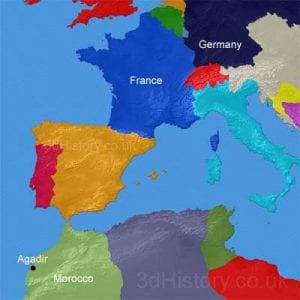The Second Moroccan Crises of 1911 is considered to be the result of European conflict, which was the case for most international conflicts before 1914, the start of World War 1. Reasoning for this claim could be that France wanted to expand their imperialistic power into Northern Africa. This would also give reason as to why Germany objected to the placement of French troops in Fez, Morocco.
While many of these views can be considered true, there are also ulterior motives and reasonings from different perspectives of the European powers, which will be looked at by distinguishing the different perspectives and motives of the European actors before WW1.
Firstly, taking a look at the crisis in French perspective, it is easy to justify why France sent troops to occupy Morocco. According to History.com, French authorities were made aware of potential rebel groups forming near the countries capital, Fez, and with a request made by the Sultans, decided to send in French troops to occupy the city incase of an attack that could weaken the Moroccan state. Although France may have had their own deeper motives, their actions seem justifiable because of the forthcoming situation, which they had to handle. This is the part Germany did not believe and therefore disagreed with. https://www.history.com/this-day-in-history/second-moroccan-crisis
In a German perspective, it is also easy to see why they had an issue with France occupying Moroccan land. Germany were aware of the French conquest of colonising African land, and by sending troops into Fez, it solidified German view on what France really wanted in Africa. Germany knew that if both France and Britain gained significant imperialistic power, they could become a massive problem if a European war were to breakout, which was inevitable. Germany wanted to limit French imperialism by challenging them in Fez, which proved to be useless.
Secondary European actors in this event had almost all the same reasoning. Britain had an agreement with France that ‘forced’ them to back and support France in cases like these. Although, it could be looked at as Britain did not want Germany to have important influence in Africa, and so that could be why Britain made sure to back France as much as possible, and the same could be said for Russia, even though Russia had not clearly stated its support towards France.
It is important to look at historical events in as many different views as possible, because it opens up the eyes of the historian and therefore, making it easier to tell the full story of an event, even though one could never have the full story.

http://3dhistory.co.uk/ww1/origin-of-world-war-one/morocco.php
I really like how you have a picture to prove your point.
Good Job
I wasn’t aware that it was the Sultan’s request that prompted the French to send troops. You also mentioned that the British were wary of potential German power in Africa. It would be interesting to investigate how they came to terms with French colonial ambitions and why this was accepted but German ambitions weren’t.